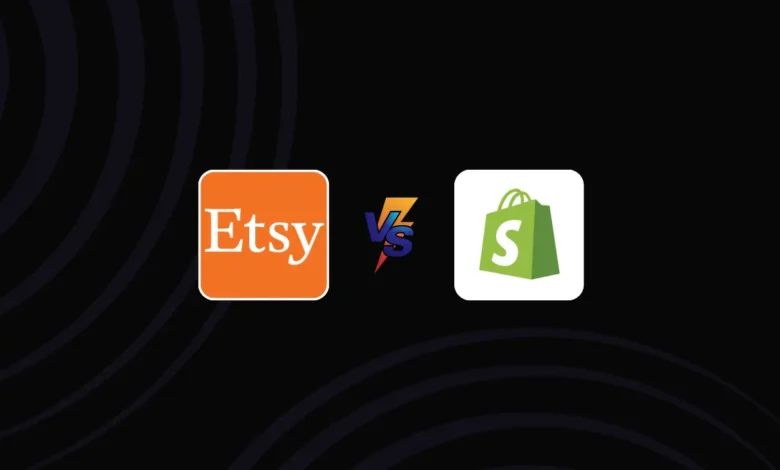Shopify vs Etsy: Discover the Perfect Platform for Your Thriving Business Needs!

If you’re exploring ways to launch your online store, you’re probably weighing your options, and two major names likely stand out: Shopify and Etsy. While both platforms serve the e-commerce market, they cater to different needs, offer unique features, and support varying levels of business growth. In this comprehensive guide, we’ll dive into everything you need to know about Shopify vs Etsy and walk you through setting up your Shopify login so you can start building your brand.
With Shopify’s new promotion—start free, then enjoy just $1/month for the first three months—there’s never been a better time to consider how Shopify can elevate your online presence.
👉 Get Started with Shopify’s $1/Month Deal.
Introduction to Shopify and Etsy
Shopify and Etsy are well-established in the e-commerce world, each with a dedicated user base and distinct market presence. But deciding between them depends on your business goals, target audience, and the level of control you want over your online store.
Shopify: Your Full-Fledged Online Store Builder
Shopify is a leading e-commerce platform designed for businesses that want to build a customized, branded online store. Shopify offers a range of tools for creating a unique storefront, from design templates to payment processing and inventory management.
Etsy: A Marketplace for Handmade and Vintage Goods
Etsy is more of a marketplace than a platform, providing a space where creators and artisans can list and sell handmade, vintage, and unique products. If your brand revolves around handcrafted goods, Etsy could be an attractive option, but it comes with limitations, especially in branding and customization.
Comparing Shopify vs Etsy: Key Features and Differences
Understanding the differences between Shopify vs Etsy can help you decide which platform aligns better with your business goals. Here’s a breakdown of some essential factors to consider:
1. Branding and Customization
- Shopify: Shopify allows you to fully brand your website, from choosing a domain name to customizing page layouts, colors, and fonts. You control your brand’s appearance, which is essential if you’re focused on long-term growth and brand recognition.
- Etsy: On Etsy, your store is hosted within Etsy’s marketplace, so branding is limited. While you can create a unique shop banner and logo, Etsy’s branding overshadows individual stores. This setup is more suitable for those who prioritize reaching an existing audience over building a standalone brand.
2. Fees and Pricing Structure
- Shopify: Shopify offers a straightforward subscription model, starting at just $1/month for the first three months with the current promotion. Afterward, monthly fees vary by plan, and there are no additional listing fees. You get access to various features based on your plan, so you have more control over costs.
- Etsy: Etsy charges listing fees, transaction fees, and payment processing fees. While listing a single item costs just $0.20, the platform takes a cut from every sale. If you’re selling high volumes, these fees can add up quickly.
👉 Start your free Shopify trial and pay only $1/month for the first 3 months, Shopify Login Here✌️
3. Inventory Management and Product Listing
- Shopify: Shopify is ideal for managing extensive inventories, offering tools for tracking stock, creating variations, and managing multiple products seamlessly. If your business deals with a large catalog or expects growth, Shopify is well-equipped for scaling.
- Etsy: Etsy’s platform supports simpler listings, often suited for low-volume sellers or artists with unique, one-off items. While it’s possible to manage multiple listings, Etsy’s tools are less robust than Shopify’s.
4. Audience and Reach
- Shopify: With Shopify, you’re responsible for driving traffic to your website, allowing you to build a unique audience through SEO, social media, and advertising. You control your customer relationships, build an email list, and foster loyalty over time.
- Etsy: Etsy’s marketplace has an existing user base searching specifically for handcrafted items. Etsy handles the marketing to bring in general traffic, making it a suitable choice for sellers looking for immediate exposure but who are less focused on customer data and retention.
Shopify Login and Setup: Getting Started
Creating a Shopify login is the first step toward building your online store. Shopify’s setup process is user-friendly, even for beginners, and gives you access to a suite of tools for managing everything from products to marketing campaigns.
Step 1: Sign Up for Shopify
- Go to the Signup Page: Start by clicking Shopify Login Here to access Shopify’s free trial and $1/month deal.
- Create Your Account: Enter your email address, password, and store name to create a Shopify login.
- Select Your Plan: With the trial, you can explore Shopify’s features without commitment. Afterward, you can choose the plan that suits your needs.
Step 2: Customize Your Store
- Choose a Theme: Shopify offers both free and premium themes. Select a design that aligns with your brand and start personalizing it.
- Add Products: Go to the “Products” section and add your inventory, including descriptions, photos, and pricing.
- Set Up Payments: Shopify provides integrated payment options, including Shopify Payments, PayPal, and others, making checkout simple for your customers.
Pros and Cons of Shopify vs Etsy
Advantages of Shopify
- Full Brand Control: Build and customize your brand.
- Advanced Features: From abandoned cart recovery to SEO tools, Shopify has robust features.
- Scalability: Shopify can grow with your business, offering unlimited listings and multichannel selling.
Shopify Login Here to Start your free Shopify trial and pay only $1/month for the first 3 months,
Advantages of Etsy
- Immediate Market Access: Etsy’s marketplace gives you access to a large, dedicated audience.
- Lower Startup Costs: Etsy is inexpensive to start with if you’re testing the waters with a side hustle.
- Handmade Marketplace Appeal: Etsy is ideal for handmade, unique, or vintage items.
Read Also: Top 7 Best WordPress Themes for 2024: Elevate Your Website Today
Driving Traffic and Boosting Sales with Shopify’s Marketing Tools
Shopify offers built-in marketing tools to help you drive traffic and maximize sales, something Etsy doesn’t offer as comprehensively. Here’s how Shopify can amplify your reach:
- SEO Tools: Shopify provides SEO features to help your website rank higher in search engines. Optimize product titles, descriptions, and images for visibility.
- Email Marketing: Connect with customers using Shopify’s email marketing options, ideal for building customer loyalty and sharing exclusive offers.
- Social Media Integration: Shopify’s platform allows seamless integration with Instagram, Facebook, TikTok, and Pinterest, helping you attract audiences from multiple channels.
Start building your brand’s online presence with Shopify and drive organic traffic with advanced SEO and marketing tools that Etsy simply doesn’t provide.
Read Also: Etsy SEO: Boost Your Shop’s Visibility and Sales on the Marketplace
Using the Shopify Mobile App for Business on the Go
Shopify’s mobile app makes it easy to manage your store on the go, from handling orders to updating products. This flexibility is especially valuable for entrepreneurs with busy schedules who need access to real-time insights and sales data. Etsy’s mobile app offers basic functionality but doesn’t match Shopify’s comprehensive approach.
Shopify vs Etsy: Which Platform is Right for You?
Choosing between Shopify and Etsy comes down to your business goals, product type, and branding needs.
- Choose Shopify If: You want to build a scalable business, have a larger product catalog, or plan to invest in long-term growth and brand recognition. Shopify’s features support growing e-commerce businesses, giving you control over your brand and customer relationships.
- Choose Etsy If: You sell handmade or vintage goods, have a smaller product range, or want immediate access to a marketplace without the need to build your own brand. Etsy is ideal for small-scale artisans and hobby sellers who prioritize market access over brand control.
👉 Try Shopify now with a $1/month offer for the first three months and see how it compares to Etsy firsthand. Shopify Login Here
Conclusion: Shopify for Long-Term Growth and Control
While Etsy serves as an excellent starting point for artisans and hobby sellers, Shopify emerges as the better choice for those seeking a robust platform that supports brand building and scalability. By investing in Shopify, you’re creating a digital space where your brand can flourish, supported by comprehensive marketing, SEO, and sales tools.
Etsy is a useful marketplace for smaller-scale sellers, but if you’re serious about building a sustainable, scalable business, Shopify’s versatility and control are unmatched.
Don’t miss out on Shopify’s limited-time $1/month for three months offer—a perfect opportunity to test the waters and see how Shopify can elevate your business.
👉 Start your Shopify journey here and take control of your e-commerce future, Shopify Login Here

